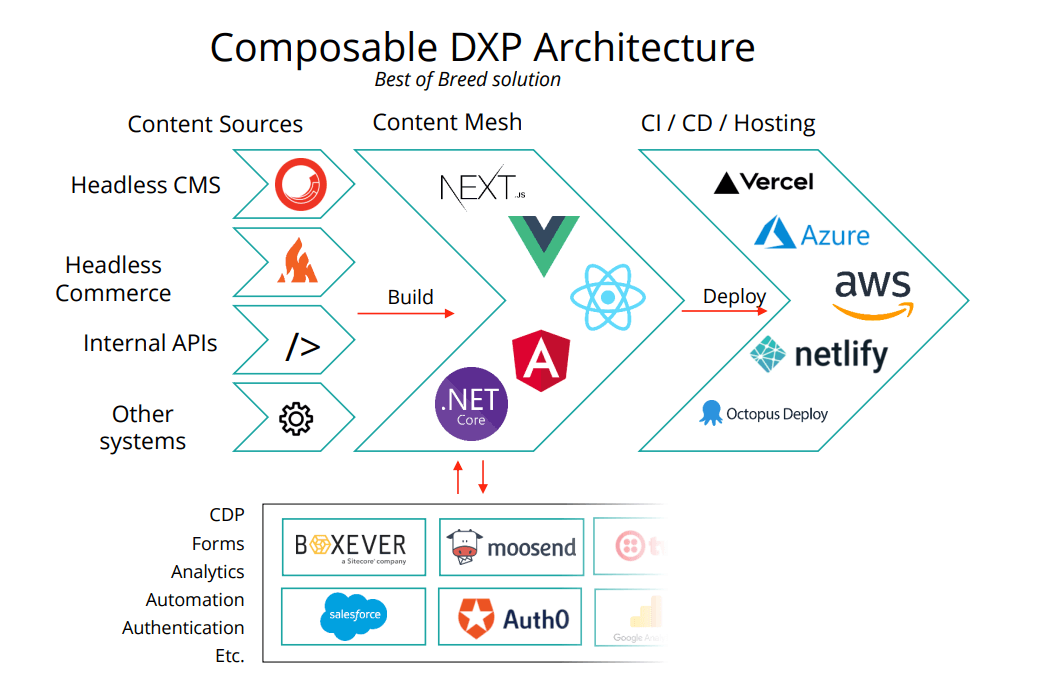Composable DXP for the Developer

Composable DXPs are becoming more popular and it's where the future of Sitecore and online digital experiences is moving towards.
The large platform DXPs are still very important, but as we move forward, composable DXPs will become more essential to the online digital experience.
But what does this mean for developers? Is moving to a composable world only something that requires work on the marketing end? Definitely NO! Don't worry developers, you are still VERY important. Moving to a composable world will take work on the developer's end for sure.
Before we dive in I want to give a quick intro of what a composable DXP is so we are all on the same page. After that I'll cover a few things developers will be interested in for the composable world.
What is a Composable DXP?
First, let's cover what a composable DXP is.
The Marketing Definition:
A composable DXP is a set of best-of-breed solutions assembled and integrated to create the Digital Experience you are looking for.
Let's look at this through the lense of a developer. Instead of having one large platform DXP created by a single company, you break down your needs into much smaller task-oriented pieces.
Individual tasks could be:
- Email Marketing
- Customer Data Platform (CDP) & Personalization
- E-Commerce
- Search
- Digital Asset Management (DAM)
- Hosting, And Much More
And it is important to note that each of these pieces could be implemented by a different company.
A recent Gartner report is calling these smaller units Packaged Business Capabilities (PBCs). You can download a copy of the report here.
Each of these PBCs is its own focused product that provides you with the capability you want. For the Sitecore world, need an E-commerce solution? Bring in OrderCloud. Need a DAM? Look at Content Hub. Require hosting? Check out Vercel for hosting!
A composable DXP is a set of individual tasks integrated by developers to accomplish your business needs.
What does this mean for developers?
Let's get to the developer content!
What does the world of composable DXP mean for the developer? What skills should you be looking to improve to prepare yourself?

1. Choices, Choices, Choices
The composable world is full of choices. You choose from best-of-breed solutions that fit your use case the best. And yes, I want you, the developer, to be a part of the decisions on what solutions to choose.
You will support these solutions, you will integrate them with other pieces of your composable system. You should vet and ensure the tech is good. Not only should it have the marketing capabilities to meet your business needs, but it should also be stable, extensible, and supported tech.
Unlike platform DXP, where all the tools are created by a single organization, you will look at many vendors trying to find what will work and grow with you best. Prioritize what is important to you as a developer. Consider these: existing community support, documentation usefulness, trial availability, etc.
2. Integratrate All the Pieces
For composable DXP, there will be a lot of work on the developer to integrate the different solutions. You will work together with marketers to ensure you both are getting the most out of solutions you choose.
Most of this work will revolve around connecting your DXP via APIs. This is where the choice you make becomes very important.
Gartner's, Adopt a Composable DXP Strategy to Future-Proof Your Tech Stack report states, "PBC APIs, whether coming from a vendor, a third-party or internally, must be designed in such a way that they enable assembly of different digital experiences, not just facilitate point-to-point integrations." Dowload a copy of the report here.
This is important! When integrating pieces of your composable solution, it's more than just passing data around. As a developer, you need to realize what data will be used the most, what and where data will be stored. Working closely with marketers, will help you make the right choices. In addition to connecting APIs you may implement streaming, caching, and other strategies to best optimize your DXP integration.
It's about enabling digital experiences. Working closely with the vendors and marketers can help you achieve this.
3. Deployment Orchestration
Last, deployments in the composable world are something that may be trickier for the developer. You will have different solutions built by different vendors that you need to coordinate and ensure they are deploying properly. A thought out Continuous Integration and Continuous Deployment (CI/CD) solution will be necessary.
Again, from Gartner, "To become composable, applications must modularize features into encapsulated PCBs to allow for independent deployment." You really want each of your composable components to deploy independently. If you find yourself in a situation where item X needs to deploy before item Y, but Y depends on Z, and so on. You are in for a difficult and messy deployment.
Think ahead and consider dependencies carefully. Deploying inside your composable DXP shouldn't make you uneasy.
Closing Thoughts
If current predictions come true. Composable DXP is the future. Companies, marketers, developers are going to need to adapt to these changes.
Being a developer in this space means you'll need to be making educated choices on what composable software to use. You will need to learn how to integrate PBC's not only passing data around but experimenting and innovating on how you provide digital experiences. Last, you will want to put time and resources into ensuring smooth deployments. There may be more moving pieces now, but that doesn't mean deployments should be scary.
Embrace composable DXP, it's the future of digital experience.